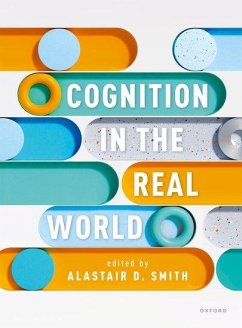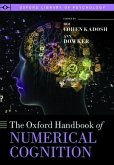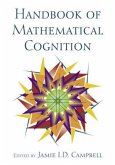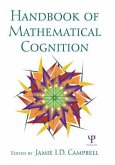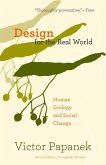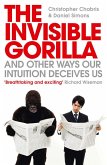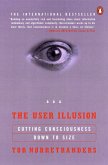Cognition in the Real World
Herausgeber: Smith, Alastair D.
Cognition in the Real World
Herausgeber: Smith, Alastair D.
- Broschiertes Buch
- Merkliste
- Auf die Merkliste
- Bewerten Bewerten
- Teilen
- Produkt teilen
- Produkterinnerung
- Produkterinnerung
Cognition in the Real World offers a fresh take on cognitive psychology by focusing on everyday behaviours to place our understanding of the mind in a real-world context. Instead of looking at functions in isolation, it explores how different cognitive processes work together when we perform common activities.
Andere Kunden interessierten sich auch für
![The Oxford Handbook of Numerical Cognition The Oxford Handbook of Numerical Cognition]() The Oxford Handbook of Numerical Cognition103,99 €
The Oxford Handbook of Numerical Cognition103,99 €![The Handbook of Mathematical Cognition The Handbook of Mathematical Cognition]() Jamie I.D. CampbellThe Handbook of Mathematical Cognition143,99 €
Jamie I.D. CampbellThe Handbook of Mathematical Cognition143,99 €![The Handbook of Mathematical Cognition The Handbook of Mathematical Cognition]() Jamie I.D. CampbellThe Handbook of Mathematical Cognition65,99 €
Jamie I.D. CampbellThe Handbook of Mathematical Cognition65,99 €![Racism and Ethnic Relations in the Portuguese-Speaking World Racism and Ethnic Relations in the Portuguese-Speaking World]() Racism and Ethnic Relations in the Portuguese-Speaking World61,99 €
Racism and Ethnic Relations in the Portuguese-Speaking World61,99 €![Design for the Real World Design for the Real World]() Victor PapanekDesign for the Real World22,99 €
Victor PapanekDesign for the Real World22,99 €![The Invisible Gorilla The Invisible Gorilla]() Christopher ChabrisThe Invisible Gorilla10,99 €
Christopher ChabrisThe Invisible Gorilla10,99 €![The User Illusion The User Illusion]() Tor NorretrandersThe User Illusion18,99 €
Tor NorretrandersThe User Illusion18,99 €-
-
-
Cognition in the Real World offers a fresh take on cognitive psychology by focusing on everyday behaviours to place our understanding of the mind in a real-world context. Instead of looking at functions in isolation, it explores how different cognitive processes work together when we perform common activities.
Hinweis: Dieser Artikel kann nur an eine deutsche Lieferadresse ausgeliefert werden.
Hinweis: Dieser Artikel kann nur an eine deutsche Lieferadresse ausgeliefert werden.
Produktdetails
- Produktdetails
- Verlag: Oxford University Press
- Seitenzahl: 528
- Erscheinungstermin: 1. Mai 2023
- Englisch
- Abmessung: 260mm x 192mm x 23mm
- Gewicht: 1122g
- ISBN-13: 9780198790914
- ISBN-10: 0198790910
- Artikelnr.: 64137163
- Herstellerkennzeichnung
- Libri GmbH
- Europaallee 1
- 36244 Bad Hersfeld
- gpsr@libri.de
- Verlag: Oxford University Press
- Seitenzahl: 528
- Erscheinungstermin: 1. Mai 2023
- Englisch
- Abmessung: 260mm x 192mm x 23mm
- Gewicht: 1122g
- ISBN-13: 9780198790914
- ISBN-10: 0198790910
- Artikelnr.: 64137163
- Herstellerkennzeichnung
- Libri GmbH
- Europaallee 1
- 36244 Bad Hersfeld
- gpsr@libri.de
Dr Alastair D. Smith is an Associate Professor (Reader) in the School of Psychology at the University of Plymouth. He received a BSc in Psychology from the University of Birmingham, and a PhD from the University of Bristol, where he then worked as a Research Fellow. He took up a lectureship at the University of Nottingham in 2008, and moved to his current role in 2017. Dr Smith runs the Spatial Behaviour Laboratory at Plymouth and is also a Lab Head in the Brain Research and Imaging Centre (BRIC). His work focuses on the cognitive and neural foundations of human spatial abilities and he has published research on typical and atypical function using a variety of empirical methods.
* 1: Alastair D. Smith: Introduction
* Part 1: Perception and Attention
* 3: Tom Foulsham: Looking behaviour in real-world search
* 4: Harriet Allen: Attention and driving
* 5: Markus Bindemann and Matthew C. Fysh: Person identification at
passport control: Matching of unfamiliar faces
* 6: Elizabeth Sheppard: Cultural differences in visual cognition
* 7: Alastair D. Smith: Perception and Attention: Summary
* Part 2: Movement and Action
* 9: Alastair D. Smith: Making my mark: Using drawing behaviour to
understand cognitive impairment
* 10: Lauren Marsh: The Principles of People Watching: Understanding
the actions and intentions of others
* 11: Alastair D. Smith: Finding your way: Navigation and the
acquisition of spatial knowledge
* 12: Alastair D. Smith: Movement and Action: Summary
* Part 3: Memory and Emotion
* 14: Kate Bailey and Peter Chapman: The Best of Times, the Worst of
Times: Memory for Emotional Experiences
* 15: Chris J. A. Moulin: Been there, done that: A cognitive account of
déjà vu
* 16: Catherine Loveday: Prokofiev makes me productive: Examining the
possibility of music as a cognitive enhancer
* 17: Alastair D. Smith: Memory and Emotion: Summary
* Part 4: Speech and Language
* 19: Anne Cutler, Janise Farrell, and Laurence Bruggeman: Passing the
time of day: The cognition of chatting
* 20: Ruth Filik: Are you being serious? Detection of irony and sarcasm
in language
* 21: Walter van Heuven: Learning an additional language: Consequences
for language and cognitive processes
* 22: Alastair D. Smith: Speech and Language: Summary
* Part 5: Learning and Decision-Making
* 23: Alastair D. Smith: Learning and Decision-Making: Introduction
* 24: Mark Haselgrove and Nicola Byrom: Associative learning and
personality
* 25: Fenja Ziegler: Making choices for others: The psychology of
surrogate decision-making
* 26: Richard J. Tunney: The psychology of financial crises: How biases
in individual decision-making affect the efficiency of markets
* 27: Alastair D. Smith: Learning and Decision-Making: Summary
* Part 6: Commentary
* 28: Vicki Bruce: Cognition in time and place
* Part 1: Perception and Attention
* 3: Tom Foulsham: Looking behaviour in real-world search
* 4: Harriet Allen: Attention and driving
* 5: Markus Bindemann and Matthew C. Fysh: Person identification at
passport control: Matching of unfamiliar faces
* 6: Elizabeth Sheppard: Cultural differences in visual cognition
* 7: Alastair D. Smith: Perception and Attention: Summary
* Part 2: Movement and Action
* 9: Alastair D. Smith: Making my mark: Using drawing behaviour to
understand cognitive impairment
* 10: Lauren Marsh: The Principles of People Watching: Understanding
the actions and intentions of others
* 11: Alastair D. Smith: Finding your way: Navigation and the
acquisition of spatial knowledge
* 12: Alastair D. Smith: Movement and Action: Summary
* Part 3: Memory and Emotion
* 14: Kate Bailey and Peter Chapman: The Best of Times, the Worst of
Times: Memory for Emotional Experiences
* 15: Chris J. A. Moulin: Been there, done that: A cognitive account of
déjà vu
* 16: Catherine Loveday: Prokofiev makes me productive: Examining the
possibility of music as a cognitive enhancer
* 17: Alastair D. Smith: Memory and Emotion: Summary
* Part 4: Speech and Language
* 19: Anne Cutler, Janise Farrell, and Laurence Bruggeman: Passing the
time of day: The cognition of chatting
* 20: Ruth Filik: Are you being serious? Detection of irony and sarcasm
in language
* 21: Walter van Heuven: Learning an additional language: Consequences
for language and cognitive processes
* 22: Alastair D. Smith: Speech and Language: Summary
* Part 5: Learning and Decision-Making
* 23: Alastair D. Smith: Learning and Decision-Making: Introduction
* 24: Mark Haselgrove and Nicola Byrom: Associative learning and
personality
* 25: Fenja Ziegler: Making choices for others: The psychology of
surrogate decision-making
* 26: Richard J. Tunney: The psychology of financial crises: How biases
in individual decision-making affect the efficiency of markets
* 27: Alastair D. Smith: Learning and Decision-Making: Summary
* Part 6: Commentary
* 28: Vicki Bruce: Cognition in time and place
* 1: Alastair D. Smith: Introduction
* Part 1: Perception and Attention
* 3: Tom Foulsham: Looking behaviour in real-world search
* 4: Harriet Allen: Attention and driving
* 5: Markus Bindemann and Matthew C. Fysh: Person identification at
passport control: Matching of unfamiliar faces
* 6: Elizabeth Sheppard: Cultural differences in visual cognition
* 7: Alastair D. Smith: Perception and Attention: Summary
* Part 2: Movement and Action
* 9: Alastair D. Smith: Making my mark: Using drawing behaviour to
understand cognitive impairment
* 10: Lauren Marsh: The Principles of People Watching: Understanding
the actions and intentions of others
* 11: Alastair D. Smith: Finding your way: Navigation and the
acquisition of spatial knowledge
* 12: Alastair D. Smith: Movement and Action: Summary
* Part 3: Memory and Emotion
* 14: Kate Bailey and Peter Chapman: The Best of Times, the Worst of
Times: Memory for Emotional Experiences
* 15: Chris J. A. Moulin: Been there, done that: A cognitive account of
déjà vu
* 16: Catherine Loveday: Prokofiev makes me productive: Examining the
possibility of music as a cognitive enhancer
* 17: Alastair D. Smith: Memory and Emotion: Summary
* Part 4: Speech and Language
* 19: Anne Cutler, Janise Farrell, and Laurence Bruggeman: Passing the
time of day: The cognition of chatting
* 20: Ruth Filik: Are you being serious? Detection of irony and sarcasm
in language
* 21: Walter van Heuven: Learning an additional language: Consequences
for language and cognitive processes
* 22: Alastair D. Smith: Speech and Language: Summary
* Part 5: Learning and Decision-Making
* 23: Alastair D. Smith: Learning and Decision-Making: Introduction
* 24: Mark Haselgrove and Nicola Byrom: Associative learning and
personality
* 25: Fenja Ziegler: Making choices for others: The psychology of
surrogate decision-making
* 26: Richard J. Tunney: The psychology of financial crises: How biases
in individual decision-making affect the efficiency of markets
* 27: Alastair D. Smith: Learning and Decision-Making: Summary
* Part 6: Commentary
* 28: Vicki Bruce: Cognition in time and place
* Part 1: Perception and Attention
* 3: Tom Foulsham: Looking behaviour in real-world search
* 4: Harriet Allen: Attention and driving
* 5: Markus Bindemann and Matthew C. Fysh: Person identification at
passport control: Matching of unfamiliar faces
* 6: Elizabeth Sheppard: Cultural differences in visual cognition
* 7: Alastair D. Smith: Perception and Attention: Summary
* Part 2: Movement and Action
* 9: Alastair D. Smith: Making my mark: Using drawing behaviour to
understand cognitive impairment
* 10: Lauren Marsh: The Principles of People Watching: Understanding
the actions and intentions of others
* 11: Alastair D. Smith: Finding your way: Navigation and the
acquisition of spatial knowledge
* 12: Alastair D. Smith: Movement and Action: Summary
* Part 3: Memory and Emotion
* 14: Kate Bailey and Peter Chapman: The Best of Times, the Worst of
Times: Memory for Emotional Experiences
* 15: Chris J. A. Moulin: Been there, done that: A cognitive account of
déjà vu
* 16: Catherine Loveday: Prokofiev makes me productive: Examining the
possibility of music as a cognitive enhancer
* 17: Alastair D. Smith: Memory and Emotion: Summary
* Part 4: Speech and Language
* 19: Anne Cutler, Janise Farrell, and Laurence Bruggeman: Passing the
time of day: The cognition of chatting
* 20: Ruth Filik: Are you being serious? Detection of irony and sarcasm
in language
* 21: Walter van Heuven: Learning an additional language: Consequences
for language and cognitive processes
* 22: Alastair D. Smith: Speech and Language: Summary
* Part 5: Learning and Decision-Making
* 23: Alastair D. Smith: Learning and Decision-Making: Introduction
* 24: Mark Haselgrove and Nicola Byrom: Associative learning and
personality
* 25: Fenja Ziegler: Making choices for others: The psychology of
surrogate decision-making
* 26: Richard J. Tunney: The psychology of financial crises: How biases
in individual decision-making affect the efficiency of markets
* 27: Alastair D. Smith: Learning and Decision-Making: Summary
* Part 6: Commentary
* 28: Vicki Bruce: Cognition in time and place

